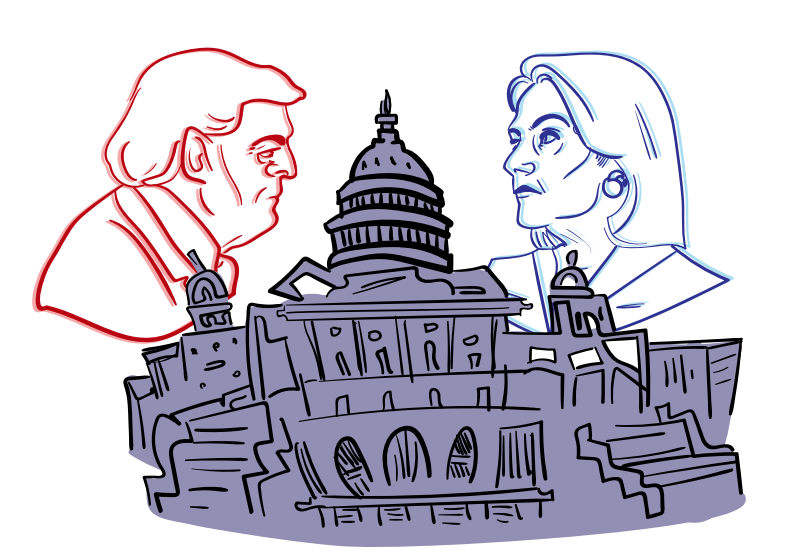Staff Stance: Partisan Politics
April 13, 2020
America has become increasingly polarized with intense personal political divides that have seeped into virtually all aspects of our lives. According to the Harvard Political Review, half of all Republicans surveyed would be ‘somewhat or very unhappy’ if their child married a Democrat, along with a third of all Democrats who share this sentiment. These statistics reflect a 1000% increase from the 1960s, highlighting the increasingly divided America we live in that has established distinct borders between both political groups. Partisan politics are an issue that has festered within American society over the past few decades, and a solution is necessary in order to begin passing legislation and creating policy that will benefit all Americans. To escape from the partisan politics that are constant in our lives, politicians must find the power to move beyond their starkly drawn party lines and compromise over pressing issues.
The divide between the Democratic Party and the Republican Party is fascinating considering that economically both parties share similarities. Both tend to favor a free market, although Democrats commonly support minimal government intervention, while Republicans support a largely deregulated economy. However, this difference pales in comparison to their stances on social issues. Democrats generally support progressive social rights. Republicans generally support traditional values. While some may consider the difference largely inconsequential , a majority of the country has found themselves divided on whether they should vote for a centrist party or a more conservative party, among a variety of other parties offered within the American political compass. At first glance, the divide can be considered unnatural, but considering shifting demographics, it makes sense that liberals would refuse to compromise on the social rights of racial minorities, women and the LGBTQ community. This lack of compromise on social issues is seen in debates around immigration, travel bans, family separation and the appointment of Supreme Court justices who could challenge the legality of abortions or the Affordable Care Act.
Considering the recent events regarding President Trump’s impeachment trial and acquittal, it is clear that partisanship played a large role in the impeachment. On the charge of abuse of power, Mitt Romney (R-UT) was the only Republican that voted to convict Trump. This scenario emphasizes how partisan politics were a major factor for the majority of senators who voted. Following the trial, Trump openly admitted that he, in fact, did send his personal lawyer Rudy Guiliani to Ukraine to gather information on 2020 presidential candidate Joe Biden and strongly encouraged Ukraine to investigate Biden before the 2020 election. This statement was a complete reversal in Trump’s previous statements and demonstrates a clear abuse of power in how he used his political power to pressure Ukraine into investigating the Bidens for his benefit. Despite this, the Senate will not censure the President, enforcing the idea that partisan politics has completely ruined the American government’s ability to function ethically. These themes raise concerns about the structure of the United States government.
A key development that has added to the partisan divides within America is the shifting of political demographics across parties. According to professor Lilliana Mason at the University of Maryland, Republicans have largely become white, Christian, rural and male, while Democrats have become nonwhite, non-Christian, urban and female. The divides in voter demographics across parties have contributed to the increasing personal impact politics has on Americans—losing an election has become a personal loss for an entire social group rather than just a political party. To combat this, politicians must cross political divides to find a compromise and incorporate the desires of both parties into new policy and legislation.
Another factor that has contributed to the polarization of American politics is a shift in what Republican and Democrats consider top priority issues. In 2009, a Pew survey showed 83% of Republicans and 88% of Democrats agree that strengthening the economy is a top priority issue. Both parties also agreed that improving the job situation in America is a top priority issue despite their supposed differences. This allowed for more policies to pass, such as the Troubled Asset Relief Program that promoted jobs and economic growth and appealed to top priority issues of both parties. More recently, Congress passed the United States-Mexico-Canada Agreement, which is a free trade deal that negotiates a considerable share of domestic imports for Americans employed in struggling economic sectors such as the automobile and agricultural industries. Additionally, both parties manage to find common ground on matters of defense, signing into law increasingly more expensive military budgets every year. The 2020 budget came in at $934 billion. Yet, Pew research shows a 19 point gap between what each party deems a top priority issue. This has led to an inability to pass legislation, as both parties struggle to find issues they believe are compromisable and top priority.
For many Americans, politics is about domination. It’s about one side passing legislation that comes at the other side’s expense. The two competing voices in our country disagree on major social issues that affect countless people. It’s fair that the average American looks at the congressional gridlock as a shortcoming of our particular breed of representative government. These two competing voices will forever remain in gridlock if the seemingly diverse interests they represent do not agree about the future of the country. Perhaps they never will. Finding compromise on specific issues regarding the economy and defense industry offers a hopeful starting point for both political parties to reach agreements in the future.


